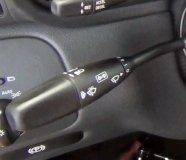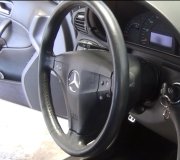There's different flashers depending on how many lights it has to run. Dodge trucks also came with a heavy duty flasher in the glove box, from the factory, for use when pulling a trailer. Some of the heavy duty flashers are not affected by adding more lights.
In the standard duty flasher, there's a heating element across the contacts. Current flow through the element AND the bulbs causes the element to heat up. The element is wrapped around a bimetallic strip which is the arm of one of the contacts. As it heats, it bends, makes contact, and full current flows to the bulbs. The contacts bypass the heating element so it cools until the contacts, and the lights, turn off. Then the process starts all over. Because of this design, the instant you turn the signals on, the lights will be OFF for a second or two, then they will start to blink. If a bulb is burned out, less current flows so it takes longer to warm up the heating element. This is why they blink very slowly or not at all. Anything that adds resistance, (pitted contacts, corroded wire or connector, burned out bulb, etc.) Reduces the flash rate.
In the heavy duty flasher, the contacts are on when it is at rest, (as opposed the standard flasher which is off at rest). The heating element is in series with the contacts rather than across the contacts. The instant this unit is turned on, the lights will also be on. As the element warms up, the lights will blink off. The open contacts stop current flow so the element cools and starts over. These flashers are less susceptible to a burned out bulb; they just take a little longer to start flashing.
When the signals do not flash at all, or stop flashing due to insufficient current flow, the lights will stay on if you have a heavy duty flasher; they will stay off with a standard flasher.
As a quick test, try switching the two flashers in your truck. The hazard flasher is designed for six to eight bulbs, so it might flash a little slow because there are only three or four bulbs per side, but it should work. If you continually burn out flashers, check for damaged wires in a trailer connector. Also, NAPA has an electronic flasher with a small relay inside. Not sure what their thinking was, but I found two of them in a truck in a junk yard.
Caradiodoc
Saturday, April 25th, 2009 AT 3:57 AM



